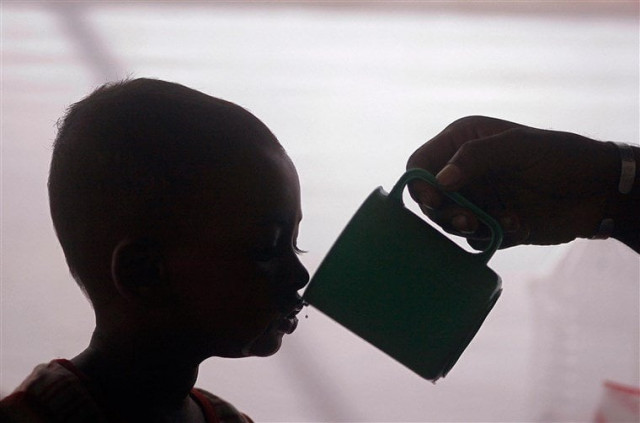Japan to spend $10.6m on nutrition, health
Signs MoU with UNDP, WFP; also to contribute to increasing resilience to disasters

PHOTO: REUTERS
This is part of a partnership that the government of Japan signed with the United Nations Development Programme (UNDP) and the World Food Programme (WFP) in Islamabad on Monday.
Out of the total US$10.6 million, US$3.5 million will be used for early identification and treatment of 155,000 acutely malnourished mothers and children in the K-P, including families who have been displaced from Afghanistan and vulnerable host populations.
“The WFP is extremely grateful for the continued partnership and generosity of the Japanese government in providing emergency life-saving nutritional support for malnourished mothers and children. We are proud to be working together to support some of Pakistan’s most vulnerable families,” said the WFP Representative Finbarr Curran.
The Japanese contribution also includes US$3.55 million for the UNDP’s stabilisation through Inclusive livelihoods initiative in the K-P’s tribal districts, which is being implemented in close collaboration with the K-P government and the erstwhile Fata Secretariat.
It will support 20,700 people by improving their access to basic services, enhancing their economic opportunities and improving social cohesion in Kurram and Orakzai tribal districts.
Promoting Japanese culture: Japan confers prestigious award on Hamdard chief
In addition, the Japanese government will support Pakistan at national and local levels to prepare for natural disasters, pilot tsunami early warning systems, and enhance resilience of coastal communities to coastal hazards with a specific focus on women and children.
Implemented in Malir and Karachi West districts of Sindh and Gwadar district of Balochistan province, this project will benefit 15,000 people.
The project is being implemented by the UNDP in partnership with the National Disaster Management Authority (NDMA), provincial DMAs of Sindh and Balochistan, the Pakistan Meteorological Department, district administrations of Karachi (Malir and West Karachi) and Gwadar, and other technical and community-based organisations working in the coastal areas.
“Empowering vulnerable local communities and enhancing their resilience to withstand crises requires coordinated efforts by all stakeholders. The generous support provided by the government of Japan will be an important step towards helping improve livelihoods of the people returning to the tribal districts of Khyber Pakhtunkhwa, and will complement efforts to support successful implementation of the Sendai Framework for Disaster Risk Reduction in the coastal areas of Sindh and Balochistan,” said the UNDP Pakistan Resident Representative Ignacio Artaza.
Japanese Ambassador Designate Kuninori Matsuda said through these fundings for Afghan refugees and their hosting communities, and the people in the newly merged districts of K-P, Japan would like to show its message to the people that it continues its support for the stabilisation of their life.
“By sharing experiences of natural disasters in Japan, we secure our cooperation to share efficient monitoring and warning systems for earthquake and tsunami through the UNDP’s policy and instructive support,” Matsuda said.
The Economic Affairs Division Additional Secretary Zulfiqar Haider said these projects reflect the continued efforts of the UN system in Pakistan to achieve the Sustainable Development Goals.
NDMA Chairman Lt Gen Omar Mahmood Hayat said this initiative is a welcome step to enhance the capability of the government of Pakistan to tackle crises.



















COMMENTS
Comments are moderated and generally will be posted if they are on-topic and not abusive.
For more information, please see our Comments FAQ